Here are excerpts from the many speeches of the moving and unforgettable journey of Pope Benedict XVI to the United States of America, May 15-20, 2008:
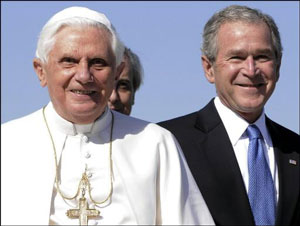 Pope Benedict XVI was received by President Bush at the Andrews Air Force Base in Maryland, on April 15 Pope Benedict XVI was received by President Bush at the Andrews Air Force Base in Maryland, on April 15 |
Holy Father, Laura and I are privileged to have you here at the White House. We welcome you with the ancient words commended by Saint Augustine: "Pax Tecum." Peace be with you.
You've chosen to visit America on your birthday. Well, birthdays are traditionally spent with close friends, so our entire nation is moved and honored that you've decided to share this special day with us. We wish you much health and happiness -- today and for many years to come. (Applause.)
This is your first trip to the United States since you ascended to the Chair of Saint Peter. You will visit two of our greatest cities and meet countless Americans, including many who have traveled from across the country to see with you and to share in the joy of this visit. Here in America you'll find a nation of prayer. Each day millions of our citizens approach our Maker on bended knee, seeking His grace and giving thanks for the many blessings He bestows upon us. Millions of Americans have been praying for your visit, and millions look forward to praying with you this week.
Here in America you'll find a nation of compassion. Americans believe that the measure of a free society is how we treat the weakest and most vulnerable among us. So each day citizens across America answer the universal call to feed the hungry and comfort the sick and care for the infirm. Each day across the world the United States is working to eradicate disease, alleviate poverty, promote peace and bring the light of hope to places still mired in the darkness of tyranny and despair.
Here in America you'll find a nation that welcomes the role of faith in the public square. When our Founders declared our nation's independence, they rested their case on an appeal to the "laws of nature, and of nature's God." We believe in religious liberty. We also believe that a love for freedom and a common moral law are written into every human heart, and that these constitute the firm foundation on which any successful free society must be built.
Here in America, you'll find a nation that is fully modern, yet guided by ancient and eternal truths. The United States is the most innovative, creative and dynamic country on earth -- it is also among the most religious. In our nation, faith and reason coexist in harmony. This is one of our country's greatest strengths, and one of the reasons that our land remains a beacon of hope and opportunity for millions across the world.
Most of all, Holy Father, you will find in America people whose hearts are open to your message of hope. And America and the world need this message. In a world where some invoke the name of God to justify acts of terror and murder and hate, we need your message that "God is love." And embracing this love is the surest way to save men from "falling prey to the teaching of fanaticism and terrorism."
In a world where some treat life as something to be debased and discarded, we need your message that all human life is sacred, and that "each of us is willed, each of us is loved" -- (applause) -- and your message that "each of us is willed, each of us is loved, and each of us is necessary."
In a world where some no longer believe that we can distinguish between simple right and wrong, we need your message to reject this "dictatorship of relativism," and embrace a culture of justice and truth. (Applause.)
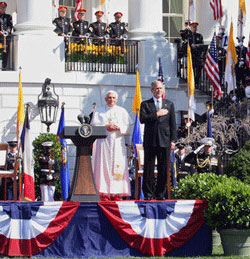 In a world where some see freedom as simply the right to do as they wish, we need your message that true liberty requires us to live our freedom not just for ourselves, but "in a spirit of mutual support."
In a world where some see freedom as simply the right to do as they wish, we need your message that true liberty requires us to live our freedom not just for ourselves, but "in a spirit of mutual support."
Holy Father, thank you for making this journey to America. Our nation welcomes you. We appreciate the example you set for the world, and we ask that you always keep us in your prayers. (Applause.)
From the dawn of the Republic, America’s quest for freedom has been guided by the conviction that the principles governing political and social life are intimately linked to a moral order based on the dominion of God the Creator. The framers of this nation’s founding documents drew upon this conviction when they proclaimed the "self-evident truth" that all men are created equal and endowed with inalienable rights grounded in the laws of nature and of nature’s God. The course of American history demonstrates the difficulties, the struggles, and the great intellectual and moral resolve which were demanded to shape a society which faithfully embodied these noble principles. In that process, which forged the soul of the nation, religious beliefs were a constant inspiration and driving force, as for example in the struggle against slavery and in the civil rights movement. In our time too, particularly in moments of crisis, Americans continue to find their strength in a commitment to this patrimony of shared ideals and aspirations.
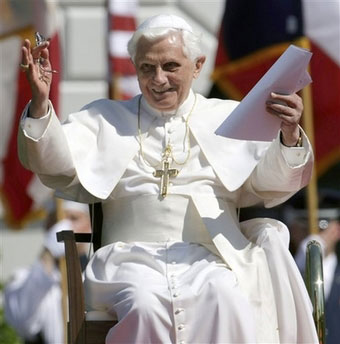 The Church, for her part, wishes to contribute to building a world ever more worthy of the human person, created in the image and likeness of God (cf. Gen 1:26-27). She is convinced that faith sheds new light on all things, and that the Gospel reveals the noble vocation and sublime destiny of every man and woman (cf. Gaudium et Spes, 10). Faith also gives us the strength to respond to our high calling, and the hope that inspires us to work for an ever more just and fraternal society. Democracy can only flourish, as your founding fathers realized, when political leaders and those whom they represent are guided by truth and bring the wisdom born of firm moral principle to decisions affecting the life and future of the nation.
The Church, for her part, wishes to contribute to building a world ever more worthy of the human person, created in the image and likeness of God (cf. Gen 1:26-27). She is convinced that faith sheds new light on all things, and that the Gospel reveals the noble vocation and sublime destiny of every man and woman (cf. Gaudium et Spes, 10). Faith also gives us the strength to respond to our high calling, and the hope that inspires us to work for an ever more just and fraternal society. Democracy can only flourish, as your founding fathers realized, when political leaders and those whom they represent are guided by truth and bring the wisdom born of firm moral principle to decisions affecting the life and future of the nation.
Mr. President, dear friends: as I begin my visit to the United States, I express once more my gratitude for your invitation, my joy to be in your midst, and my fervent prayers that Almighty God will confirm this nation and its people in the ways of justice, prosperity and peace. God bless America!
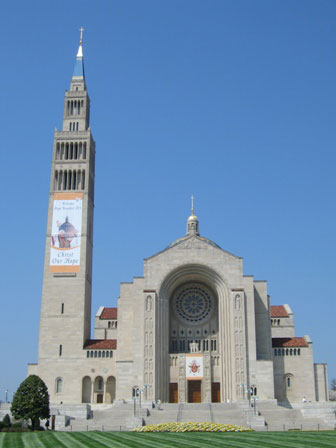 While it is true that this country is marked by a genuinely religious spirit, the subtle influence of secularism can nevertheless color the way people allow their faith to influence their behavior. Is it consistent to profess our beliefs in church on Sunday, and then during the week to promote business practices or medical procedures contrary to those beliefs? Is it consistent for practicing Catholics to ignore or exploit the poor and the marginalized, to promote sexual behavior contrary to Catholic moral teaching, or to adopt positions that contradict the right to life of every human being from conception to natural death? Any tendency to treat religion as a private matter must be resisted. Only when their faith permeates every aspect of their lives do Christians become truly open to the transforming power of the Gospel.
While it is true that this country is marked by a genuinely religious spirit, the subtle influence of secularism can nevertheless color the way people allow their faith to influence their behavior. Is it consistent to profess our beliefs in church on Sunday, and then during the week to promote business practices or medical procedures contrary to those beliefs? Is it consistent for practicing Catholics to ignore or exploit the poor and the marginalized, to promote sexual behavior contrary to Catholic moral teaching, or to adopt positions that contradict the right to life of every human being from conception to natural death? Any tendency to treat religion as a private matter must be resisted. Only when their faith permeates every aspect of their lives do Christians become truly open to the transforming power of the Gospel.
For an affluent society, a further obstacle to an encounter with the living God lies in the subtle influence of materialism, which can all too easily focus the attention on the hundredfold, which God promises now in this time, at the expense of the eternal life which he promises in the age to come (cf. Mk 10:30). People today need to be reminded of the ultimate purpose of their lives. They need to recognize that implanted within them is a deep thirst for God. They need to be given opportunities to drink from the wells of his infinite love. It is easy to be entranced by the almost unlimited possibilities that science and technology place before us; it is easy to make the mistake of thinking we can obtain by our own efforts the fulfillment of our deepest needs. This is an illusion. Without God, who alone bestows upon us what we by ourselves cannot attain (cf. Spe Salvi, 31), our lives are ultimately empty. People need to be constantly reminded to cultivate a relationship with him who came that we might have life in abundance (cf. Jn 10:10). The goal of all our pastoral and catechetical work, the object of our preaching, and the focus of our sacramental ministry should be to help people establish and nurture that living relationship with "Christ Jesus, our hope" (1 Tim 1:1).
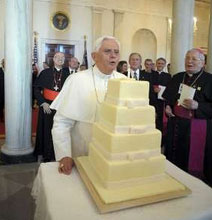 On April 16, the Pope 81st birthday was celebrated in the White House On April 16, the Pope 81st birthday was celebrated in the White House |
In a society which values personal freedom and autonomy, it is easy to lose sight of our dependence on others as well as the responsibilities that we bear towards them. This emphasis on individualism has even affected the Church (cf. Spe Salvi, 13-15), giving rise to a form of piety which sometimes emphasizes our private relationship with God at the expense of our calling to be members of a redeemed community. Yet from the beginning, God saw that "it is not good for man to be alone" (Gen 2:18). We were created as social beings who find fulfillment only in love - for God and for our neighbor. If we are truly to gaze upon him who is the source of our joy, we need to do so as members of the people of God (cf. Spe Salvi, 14). If this seems counter-cultural, that is simply further evidence of the urgent need for a renewed evangelization of culture.
The family is also the primary place for evangelization, for passing on the faith, for helping young people to appreciate the importance of religious practice and Sunday observance. How can we not be dismayed as we observe the sharp decline of the family as a basic element of Church and society? Divorce and infidelity have increased, and many young men and women are choosing to postpone marriage or to forego it altogether. To some young Catholics, the sacramental bond of marriage seems scarcely distinguishable from a civil bond, or even a purely informal and open-ended arrangement to live with another person. Hence we have an alarming decrease in the number of Catholic marriages in the United States together with an increase in cohabitation, in which the Christ-like mutual self-giving of spouses, sealed by a public promise to live out the demands of an indissoluble lifelong commitment, is simply absent. In such circumstances, children are denied the secure environment that they need in order truly to flourish as human beings, and society is denied the stable building blocks which it requires if the cohesion and moral focus of the community are to be maintained.
Children should be spared the degrading manifestations and the crude manipulation of sexuality so prevalent today. They have a right to be educated in authentic moral values rooted in the dignity of the human person. This brings us back to our consideration of the centrality of the family and the need to promote the Gospel of life. What does it mean to speak of child protection when pornography and violence can be viewed in so many homes through media widely available today? We need to reassess urgently the values underpinning society, so that a sound moral formation can be offered to young people and adults alike. All have a part to play in this task - not only parents, religious leaders, teachers and catechists, but the media and entertainment industries as well.
The Holy Father is asked to give his assessment of the challenge of increasing secularism in public life and relativism in intellectual life, and his advice on how to confront these challenges pastorally and evangelize more effectively.
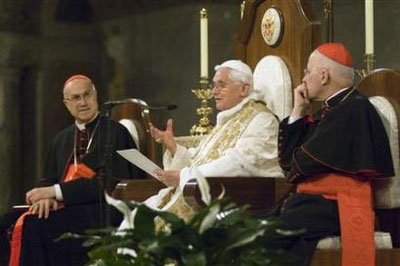 Of course, what is essential is a correct understanding of the just autonomy of the secular order, an autonomy which cannot be divorced from God the Creator and his saving plan (cf. Gaudium et Spes, 36). Perhaps America's brand of secularism poses a particular problem: it allows for professing belief in God, and respects the public role of religion and the Churches, but at the same time it can subtly reduce religious belief to a lowest common denominator. Faith becomes a passive acceptance that certain things "out there" are true, but without practical relevance for everyday life. The result is a growing separation of faith from life: living "as if God did not exist". This is aggravated by an individualistic and eclectic approach to faith and religion: far from a Catholic approach to "thinking with the Church", each person believes he or she has a right to pick and choose, maintaining external social bonds but without an integral, interior conversion to the law of Christ. Consequently, rather than being transformed and renewed in mind, Christians are easily tempted to conform themselves to the spirit of this age (cf. Rom 12:3). We have seen this emerge in an acute way in the scandal given by Catholics who promote an alleged right to abortion.
Of course, what is essential is a correct understanding of the just autonomy of the secular order, an autonomy which cannot be divorced from God the Creator and his saving plan (cf. Gaudium et Spes, 36). Perhaps America's brand of secularism poses a particular problem: it allows for professing belief in God, and respects the public role of religion and the Churches, but at the same time it can subtly reduce religious belief to a lowest common denominator. Faith becomes a passive acceptance that certain things "out there" are true, but without practical relevance for everyday life. The result is a growing separation of faith from life: living "as if God did not exist". This is aggravated by an individualistic and eclectic approach to faith and religion: far from a Catholic approach to "thinking with the Church", each person believes he or she has a right to pick and choose, maintaining external social bonds but without an integral, interior conversion to the law of Christ. Consequently, rather than being transformed and renewed in mind, Christians are easily tempted to conform themselves to the spirit of this age (cf. Rom 12:3). We have seen this emerge in an acute way in the scandal given by Catholics who promote an alleged right to abortion.
On a deeper level, secularism challenges the Church to reaffirm and to pursue more actively her mission in and to the world. As the Council made clear, the lay faithful have a particular responsibility in this regard. What is needed, I am convinced, is a greater sense of the intrinsic relationship between the Gospel and the natural law on the one hand, and, on the other, the pursuit of authentic human good, as embodied in civil law and in personal moral decisions. In a society that rightly values personal liberty, the Church needs to promote at every level of her teaching - in catechesis, preaching, seminary and university instruction - an apologetics aimed at affirming the truth of Christian revelation, the harmony of faith and reason, and a sound understanding of freedom, seen in positive terms as a liberation both from the limitations of sin and for an authentic and fulfilling life. In a word, the Gospel has to be preached and taught as an integral way of life, offering an attractive and true answer, intellectually and practically, to real human problems. The "dictatorship of relativism", in the end, is nothing less than a threat to genuine human freedom, which only matures in generosity and fidelity to the truth.
Much more, of course, could be said on this subject: let me conclude, though, by saying that I believe that the Church in America, at this point in her history, is faced with the challenge of recapturing the Catholic vision of reality and presenting it, in an engaging and imaginative way, to a society which markets any number of recipes for human fulfillment. I think in particular of our need to speak to the hearts of young people, who, despite their constant exposure to messages contrary to the Gospel, continue to thirst for authenticity, goodness and truth. Much remains to be done, particularly on the level of preaching and catechesis in parishes and schools, if the new evangelization is to bear fruit for the renewal of ecclesial life in America.
The Holy Father is asked about "a certain quiet attrition" by which Catholics are abandoning the practice of the faith, sometimes by an explicit decision, but often by distancing themselves quietly and gradually from attendance at Mass and identification with the Church.
Certainly, much of this has to do with the passing away of a religious culture, sometimes disparagingly referred to as a "ghetto", which reinforced participation and identification with the Church. As I just mentioned, one of the great challenges facing the Church in this country is that of cultivating a Catholic identity which is based not so much on externals as on a way of thinking and acting grounded in the Gospel and enriched by the Church's living tradition.
The issue clearly involves factors such as religious individualism and scandal. Let us go to the heart of the matter: faith cannot survive unless it is nourished, unless it is "formed by charity" (cf. Gal 5:6). Do people today find it difficult to encounter God in our Churches? Has our preaching lost its salt? Might it be that many people have forgotten, or never really learned, how to pray in and with the Church?
Here I am not speaking of people who leave the Church in search of subjective religious "experiences"; this is a pastoral issue which must be addressed on its own terms. I think we are speaking about people who have fallen by the wayside without consciously having rejected their faith in Christ, but, for whatever reason, have not drawn life from the liturgy, the sacraments, preaching. Yet Christian faith, as we know, is essentially ecclesial, and without a living bond to the community, the individual's faith will never grow to maturity. Indeed, to return to the question I just discussed, the result can be a quiet apostasy.
Let me conclude by stating the obvious. The fields are still ripe for harvesting (cf. Jn 4:35); God continues to give the growth (cf. 1 Cor 3:6). We can and must believe, with the late Pope John Paul II, that God is preparing a new springtime for Christianity (cf. Redemptoris Missio, 86). What is needed above all, at this time in the history of the Church in America, is a renewal of that apostolic zeal which inspires her shepherds actively to seek out the lost, to bind up those who have been wounded, and to bring strength to those who are languishing (cf. Ez 34:16). And this, as I have said, calls for new ways of thinking based on a sound diagnosis of today's challenges and a commitment to unity in the service of the Church's mission to the present generation.
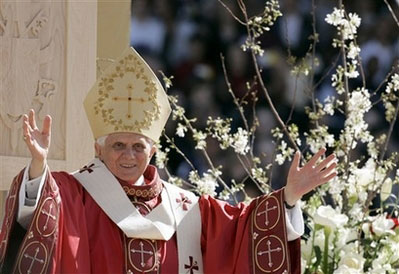 In the exercise of my ministry as the Successor of Peter, I have come to America to confirm you, my brothers and sisters, in the faith of the Apostles (cf. Lk 22:32). I have come to proclaim anew, as Peter proclaimed on the day of Pentecost, that Jesus Christ is Lord and Messiah, risen from the dead, seated in glory at the right hand of the Father, and established as judge of the living and the dead (cf. Acts 2:14ff.). I have come to repeat the Apostle’s urgent call to conversion and the forgiveness of sins, and to implore from the Lord a new outpouring of the Holy Spirit upon the Church in this country. As we have heard throughout this Easter season, the Church was born of the Spirit’s gift of repentance and faith in the risen Lord. In every age she is impelled by the same Spirit to bring to men and women of every race, language and people (cf. Rev 5:9) the good news of our reconciliation with God in Christ.
In the exercise of my ministry as the Successor of Peter, I have come to America to confirm you, my brothers and sisters, in the faith of the Apostles (cf. Lk 22:32). I have come to proclaim anew, as Peter proclaimed on the day of Pentecost, that Jesus Christ is Lord and Messiah, risen from the dead, seated in glory at the right hand of the Father, and established as judge of the living and the dead (cf. Acts 2:14ff.). I have come to repeat the Apostle’s urgent call to conversion and the forgiveness of sins, and to implore from the Lord a new outpouring of the Holy Spirit upon the Church in this country. As we have heard throughout this Easter season, the Church was born of the Spirit’s gift of repentance and faith in the risen Lord. In every age she is impelled by the same Spirit to bring to men and women of every race, language and people (cf. Rev 5:9) the good news of our reconciliation with God in Christ.
I pray, then, that this significant anniversary in the life of the Church in the United States, and the presence of the Successor of Peter in your midst, will be an occasion for all Catholics to reaffirm their unity in the apostolic faith, to offer their contemporaries a convincing account of the hope which inspires them (cf. 1 Pet 3:15), and to be renewed in missionary zeal for the extension of God’s Kingdom.
The world needs this witness! Who can deny that the present moment is a crossroads, not only for the Church in America but also for society as a whole? It is a time of great promise, as we see the human family in many ways drawing closer together and becoming ever more interdependent. Yet at the same time we see clear signs of a disturbing breakdown in the very foundations of society: signs of alienation, anger and polarization on the part of many of our contemporaries; increased violence; a weakening of the moral sense; a coarsening of social relations; and a growing forgetfulness of God. The Church, too, sees signs of immense promise in her many strong parishes and vital movements, in the enthusiasm for the faith shown by so many young people, in the number of those who each year embrace the Catholic faith, and in a greater interest in prayer and catechesis. At the same time she senses, often painfully, the presence of division and polarization in her midst, as well as the troubling realization that many of the baptized, rather than acting as a spiritual leaven in the world, are inclined to embrace attitudes contrary to the truth of the Gospel.
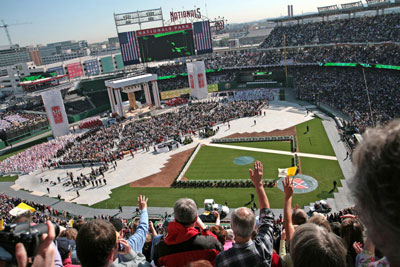 "Lord, send out your Spirit, and renew the face of the earth!" (cf. Ps 104:30). The words of today’s Responsorial Psalm are a prayer which rises up from the heart of the Church in every time and place. They remind us that the Holy Spirit has been poured out as the first fruits of a new creation, "new heavens and a new earth" (cf. 2 Pet 3:13; Rev 21:1), in which God’s peace will reign and the human family will be reconciled in justice and love. We have heard Saint Paul tell us that all creation is even now "groaning" in expectation of that true freedom which is God’s gift to his children (Rom 8:21-22), a freedom which enables us to live in conformity to his will. Today let us pray fervently that the Church in America will be renewed in that same Spirit, and sustained in her mission of proclaiming the Gospel to a world that longs for genuine freedom (cf. Jn 8:32), authentic happiness, and the fulfillment of its deepest aspirations!
"Lord, send out your Spirit, and renew the face of the earth!" (cf. Ps 104:30). The words of today’s Responsorial Psalm are a prayer which rises up from the heart of the Church in every time and place. They remind us that the Holy Spirit has been poured out as the first fruits of a new creation, "new heavens and a new earth" (cf. 2 Pet 3:13; Rev 21:1), in which God’s peace will reign and the human family will be reconciled in justice and love. We have heard Saint Paul tell us that all creation is even now "groaning" in expectation of that true freedom which is God’s gift to his children (Rom 8:21-22), a freedom which enables us to live in conformity to his will. Today let us pray fervently that the Church in America will be renewed in that same Spirit, and sustained in her mission of proclaiming the Gospel to a world that longs for genuine freedom (cf. Jn 8:32), authentic happiness, and the fulfillment of its deepest aspirations!
Here I wish to offer a special word of gratitude and encouragement to all those who have taken up the challenge of the Second Vatican Council, so often reiterated by Pope John Paul II, and committed their lives to the new evangelization. I thank my brother Bishops, priests and deacons, men and women religious, parents, teachers and catechists. The fidelity and courage with which the Church in this country will respond to the challenges raised by an increasingly secular and materialistic culture will depend in large part upon your own fidelity in handing on the treasure of our Catholic faith. Young people need to be helped to discern the path that leads to true freedom: the path of a sincere and generous imitation of Christ, the path of commitment to justice and peace. Much progress has been made in developing solid programs of catechesis, yet so much more remains to be done in forming the hearts and minds of the young in knowledge and love of the Lord. The challenges confronting us require a comprehensive and sound instruction in the truths of the faith. But they also call for cultivating a mindset, an intellectual "culture", which is genuinely Catholic, confident in the profound harmony of faith and reason, and prepared to bring the richness of faith’s vision to bear on the urgent issues which affect the future of American society.
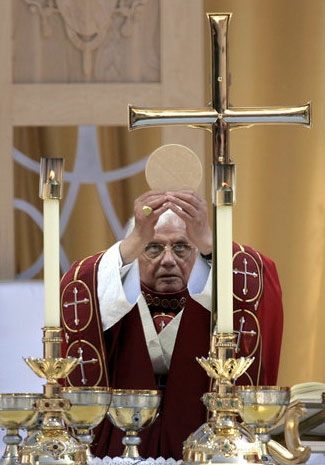 In today’s Gospel, the risen Lord bestows the gift of the Holy Spirit upon the Apostles and grants them the authority to forgive sins. Through the surpassing power of Christ’s grace, entrusted to frail human ministers, the Church is constantly reborn and each of us is given the hope of a new beginning. Let us trust in the Spirit’s power to inspire conversion, to heal every wound, to overcome every division, and to inspire new life and freedom. How much we need these gifts! And how close at hand they are, particularly in the sacrament of Penance! The liberating power of this sacrament, in which our honest confession of sin is met by God’s merciful word of pardon and peace, needs to be rediscovered and reappropriated by every Catholic. To a great extent, the renewal of the Church in America depends on the renewal of the practice of Penance and the growth in holiness which that sacrament both inspires and accomplishes.
In today’s Gospel, the risen Lord bestows the gift of the Holy Spirit upon the Apostles and grants them the authority to forgive sins. Through the surpassing power of Christ’s grace, entrusted to frail human ministers, the Church is constantly reborn and each of us is given the hope of a new beginning. Let us trust in the Spirit’s power to inspire conversion, to heal every wound, to overcome every division, and to inspire new life and freedom. How much we need these gifts! And how close at hand they are, particularly in the sacrament of Penance! The liberating power of this sacrament, in which our honest confession of sin is met by God’s merciful word of pardon and peace, needs to be rediscovered and reappropriated by every Catholic. To a great extent, the renewal of the Church in America depends on the renewal of the practice of Penance and the growth in holiness which that sacrament both inspires and accomplishes.
A concrete example of the contribution religious communities make to civil society is faith-based schools. These institutions enrich children both intellectually and spiritually. Led by their teachers to discover the divinely bestowed dignity of each human being, young people learn to respect the beliefs and practices of others, thus enhancing a nation's civic life.
What an enormous responsibility religious leaders have: to imbue society with a profound awe and respect for human life and freedom; to ensure that human dignity is recognized and cherished; to facilitate peace and justice; to teach children what is right, good and reasonable!
There is a further point I wish to touch upon here. I have noticed a growing interest among governments to sponsor programs intended to promote interreligious and intercultural dialogue. These are praiseworthy initiatives. At the same time, religious freedom, interreligious dialogue and faith-based education aim at something more than a consensus regarding ways to implement practical strategies for advancing peace. The broader purpose of dialogue is to discover the truth. What is the origin and destiny of mankind? What are good and evil? What awaits us at the end of our earthly existence? Only by addressing these deeper questions can we build a solid basis for the peace and security of the human family, for "wherever and whenever men and women are enlightened by the splendor of truth, they naturally set out on the path of peace" (Message for the 2006 World Day of Peace, 3).
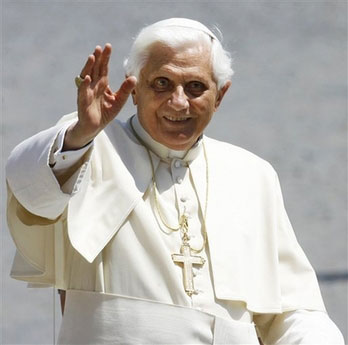 We are living in an age when these questions are too often marginalized. Yet they can never be erased from the human heart. Throughout history, men and women have striven to articulate their restlessness with this passing world. In the Judeo-Christian tradition, the Psalms are full of such expressions: "My spirit is overwhelmed within me" (Ps 143:4; cf. Ps 6:6; 31:10; 32:3; 38:8; 77:3); "why are you cast down, my soul, why groan within me?" (Ps 42:5). The response is always one of faith: "Hope in God, I will praise him still; my Savior and my God" (Ps 42:5, 11; cf. Ps 43:5; 62:5). Spiritual leaders have a special duty, and we might say competence, to place the deeper questions at the forefront of human consciousness, to reawaken mankind to the mystery of human existence, and to make space in a frenetic world for reflection and prayer.
We are living in an age when these questions are too often marginalized. Yet they can never be erased from the human heart. Throughout history, men and women have striven to articulate their restlessness with this passing world. In the Judeo-Christian tradition, the Psalms are full of such expressions: "My spirit is overwhelmed within me" (Ps 143:4; cf. Ps 6:6; 31:10; 32:3; 38:8; 77:3); "why are you cast down, my soul, why groan within me?" (Ps 42:5). The response is always one of faith: "Hope in God, I will praise him still; my Savior and my God" (Ps 42:5, 11; cf. Ps 43:5; 62:5). Spiritual leaders have a special duty, and we might say competence, to place the deeper questions at the forefront of human consciousness, to reawaken mankind to the mystery of human existence, and to make space in a frenetic world for reflection and prayer.
Confronted with these deeper questions concerning the origin and destiny of mankind, Christianity proposes Jesus of Nazareth. He, we believe, is the eternal Logos who became flesh in order to reconcile man to God and reveal the underlying reason of all things. It is he whom we bring to the forum of interreligious dialogue. The ardent desire to follow in his footsteps spurs Christians to open their minds and hearts in dialogue (cf. Lk 10:25-37; Jn 4:7-26).
Dear friends, in our attempt to discover points of commonality, perhaps we have shied away from the responsibility to discuss our differences with calmness and clarity. While always uniting our hearts and minds in the call for peace, we must also listen attentively to the voice of truth. In this way, our dialogue will not stop at identifying a common set of values, but go on to probe their ultimate foundation. We have no reason to fear, for the truth unveils for us the essential relationship between the world and God. We are able to perceive that peace is a "heavenly gift" that calls us to conform human history to the divine order. Herein lies the "truth of peace" (cf. Message for the 2006 World Day of Peace).
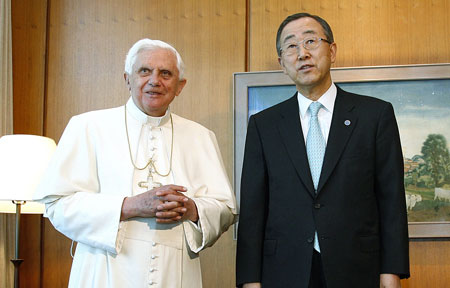 The Pope with UN Secretary General Ban Ki-Moon The Pope with UN Secretary General Ban Ki-Moon |
This reference to human dignity, which is the foundation and goal of the responsibility to protect, leads us to the theme we are specifically focusing upon this year, which marks the sixtieth anniversary of the Universal Declaration of Human Rights. This document was the outcome of a convergence of different religious and cultural traditions, all of them motivated by the common desire to place the human person at the heart of institutions, laws and the workings of society, and to consider the human person essential for the world of culture, religion and science. Human rights are increasingly being presented as the common language and the ethical substratum of international relations. At the same time, the universality, indivisibility and interdependence of human rights all serve as guarantees safeguarding human dignity. It is evident, though, that the rights recognized and expounded in the Declaration apply to everyone by virtue of the common origin of the person, who remains the high-point of God’s creative design for the world and for history. They are based on the natural law inscribed on human hearts and present in different cultures and civilizations. Removing human rights from this context would mean restricting their range and yielding to a relativistic conception, according to which the meaning and interpretation of rights could vary and their universality would be denied in the name of different cultural, political, social and even religious outlooks. This great variety of viewpoints must not be allowed to obscure the fact that not only rights are universal, but so too is the human person, the subject of those rights.
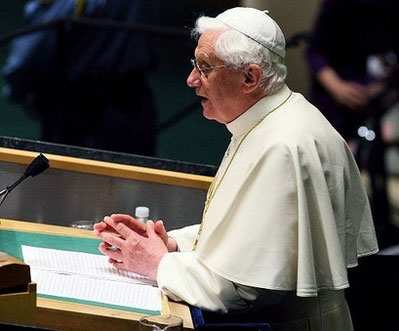 The life of the community, both domestically and internationally, clearly demonstrates that respect for rights, and the guarantees that follow from them, are measures of the common good that serve to evaluate the relationship between justice and injustice, development and poverty, security and conflict. The promotion of human rights remains the most effective strategy for eliminating inequalities between countries and social groups, and for increasing security. Indeed, the victims of hardship and despair, whose human dignity is violated with impunity, become easy prey to the call to violence, and they can then become violators of peace.
The life of the community, both domestically and internationally, clearly demonstrates that respect for rights, and the guarantees that follow from them, are measures of the common good that serve to evaluate the relationship between justice and injustice, development and poverty, security and conflict. The promotion of human rights remains the most effective strategy for eliminating inequalities between countries and social groups, and for increasing security. Indeed, the victims of hardship and despair, whose human dignity is violated with impunity, become easy prey to the call to violence, and they can then become violators of peace.
Human rights, of course, must include the right to religious freedom, understood as the expression of a dimension that is at once individual and communitarian – a vision that brings out the unity of the person while clearly distinguishing between the dimension of the citizen and that of the believer. The activity of the United Nations in recent years has ensured that public debate gives space to viewpoints inspired by a religious vision in all its dimensions, including ritual, worship, education, dissemination of information and the freedom to profess and choose religion. It is inconceivable, then, that believers should have to suppress a part of themselves – their faith – in order to be active citizens. It should never be necessary to deny God in order to enjoy one’s rights. The rights associated with religion are all the more in need of protection if they are considered to clash with a prevailing secular ideology or with majority religious positions of an exclusive nature. The full guarantee of religious liberty cannot be limited to the free exercise of worship, but has to give due consideration to the public dimension of religion, and hence to the possibility of believers playing their part in building the social order. Indeed, they actually do so, for example through their influential and generous involvement in a vast network of initiatives which extend from Universities, scientific institutions and schools to health care agencies and charitable organizations in the service of the poorest and most marginalized. Refusal to recognize the contribution to society that is rooted in the religious dimension and in the quest for the Absolute – by its nature, expressing communion between persons – would effectively privilege an individualistic approach, and would fragment the unity of the person.
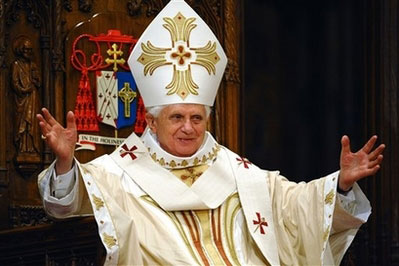 In this morning’s second reading, Saint Paul reminds us that spiritual unity -- the unity which reconciles and enriches diversity -- has its origin and supreme model in the life of the triune God. As a communion of pure love and infinite freedom, the Blessed Trinity constantly brings forth new life in the work of creation and redemption. The Church, as "a people made one by the unity of the Father, the Son and the Spirit" (cf. Lumen Gentium, 4), is called to proclaim the gift of life, to serve life, and to promote a culture of life. Here in this cathedral, our thoughts turn naturally to the heroic witness to the Gospel of life borne by the late Cardinals Cooke and O’Connor. The proclamation of life, life in abundance, must be the heart of the new evangelization. For true life -- our salvation -- can only be found in the reconciliation, freedom and love which are God’s gracious gift.
In this morning’s second reading, Saint Paul reminds us that spiritual unity -- the unity which reconciles and enriches diversity -- has its origin and supreme model in the life of the triune God. As a communion of pure love and infinite freedom, the Blessed Trinity constantly brings forth new life in the work of creation and redemption. The Church, as "a people made one by the unity of the Father, the Son and the Spirit" (cf. Lumen Gentium, 4), is called to proclaim the gift of life, to serve life, and to promote a culture of life. Here in this cathedral, our thoughts turn naturally to the heroic witness to the Gospel of life borne by the late Cardinals Cooke and O’Connor. The proclamation of life, life in abundance, must be the heart of the new evangelization. For true life -- our salvation -- can only be found in the reconciliation, freedom and love which are God’s gracious gift.
This is the message of hope we are called to proclaim and embody in a world where self-centeredness, greed, violence, and cynicism so often seem to choke the fragile growth of grace in people’s hearts. Saint Irenaeus, with great insight, understood that the command which Moses enjoined upon the people of Israel: "Choose life!" (Dt 30:19) was the ultimate reason for our obedience to all God’s commandments (cf. Adv. Haer. IV, 16, 2-5). Perhaps we have lost sight of this: in a society where the Church seems legalistic and "institutional" to many people, our most urgent challenge is to communicate the joy born of faith and the experience of God’s love.
I am particularly happy that we have gathered in Saint Patrick’s Cathedral. Perhaps more than any other church in the United States, this place is known and loved as "a house of prayer for all peoples" (cf. Is 56:7; Mk 11:17)… I would like to draw your attention to a few aspects of this beautiful structure which I think can serve as a starting point for a reflection on our particular vocations within the unity of the Mystical Body.
The first has to do with the stained glass windows, which flood the interior with mystic light. From the outside, those windows are dark, heavy, even dreary. But once one enters the church, they suddenly come alive; reflecting the light passing through them, they reveal all their splendor. Many writers -- here in America we can think of Nathaniel Hawthorne -- have used the image of stained glass to illustrate the mystery of the Church herself. It is only from the inside, from the experience of faith and ecclesial life, that we see the Church as she truly is: flooded with grace, resplendent in beauty, adorned by the manifold gifts of the Spirit. It follows that we, who live the life of grace within the Church’s communion, are called to draw all people into this mystery of light.
This is no easy task in a world which can tend to look at the Church, like those stained glass windows, "from the outside": a world which deeply senses a need for spirituality, yet finds it difficult to "enter into" the mystery of the Church. Even for those of us within, the light of faith can be dimmed by routine, and the splendor of the Church obscured by the sins and weaknesses of her members. It can be dimmed too, by the obstacles encountered in a society which sometimes seems to have forgotten God and to resent even the most elementary demands of Christian morality. You, who have devoted your lives to bearing witness to the love of Christ and the building up of his Body, know from your daily contact with the world around us how tempting it is at times to give way to frustration, disappointment and even pessimism about the future. In a word, it is not always easy to see the light of the Spirit all about us, the splendor of the Risen Lord illuminating our lives and instilling renewed hope in his victory over the world (cf. Jn 16:33).
This leads me to a further reflection about the architecture of this church. Like all Gothic cathedrals, it is a highly complex structure, whose exact and harmonious proportions symbolize the unity of God’s creation. Medieval artists often portrayed Christ, the creative Word of God, as a heavenly "geometer", compass in hand, who orders the cosmos with infinite wisdom and purpose. Does this not bring to mind our need to see all things with the eyes of faith, and thus to grasp them in their truest perspective, in the unity of God’s eternal plan? This requires, as we know, constant conversion, and a commitment to acquiring "a fresh, spiritual way of thinking" (cf. Eph 4:23). It also calls for the cultivation of those virtues which enable each of us to grow in holiness and to bear spiritual fruit within our particular state of life. Is not this ongoing "intellectual" conversion as necessary as "moral" conversion for our own growth in faith, our discernment of the signs of the times, and our personal contribution to the Church’s life and mission?
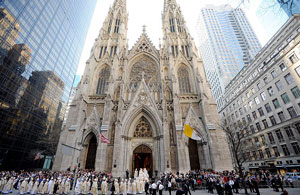 The spires of Saint Patrick’s Cathedral are dwarfed by the skyscrapers of the Manhattan skyline, yet in the heart of this busy metropolis, they are a vivid reminder of the constant yearning of the human spirit to rise to God. As we celebrate this Eucharist, let us thank the Lord for allowing us to know him in the communion of the Church, to cooperate in building up his Mystical Body, and in bringing his saving word as good news to the men and women of our time. And when we leave this great church, let us go forth as heralds of hope in the midst of this city, and all those places where God’s grace has placed us. In this way, the Church in America will know a new springtime in the Spirit, and point the way to that other, greater city, the new Jerusalem, whose light is the Lamb (Rev 21:23). For there God is even now preparing for all people a banquet of unending joy and life. Amen.
The spires of Saint Patrick’s Cathedral are dwarfed by the skyscrapers of the Manhattan skyline, yet in the heart of this busy metropolis, they are a vivid reminder of the constant yearning of the human spirit to rise to God. As we celebrate this Eucharist, let us thank the Lord for allowing us to know him in the communion of the Church, to cooperate in building up his Mystical Body, and in bringing his saving word as good news to the men and women of our time. And when we leave this great church, let us go forth as heralds of hope in the midst of this city, and all those places where God’s grace has placed us. In this way, the Church in America will know a new springtime in the Spirit, and point the way to that other, greater city, the new Jerusalem, whose light is the Lamb (Rev 21:23). For there God is even now preparing for all people a banquet of unending joy and life. Amen.
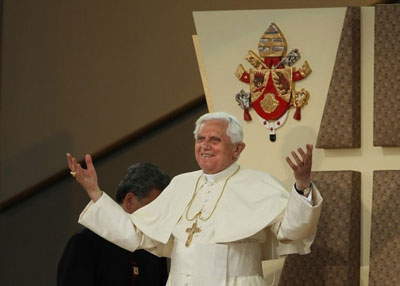 Young friends, I am very happy to have the opportunity to speak with you… In front of you are the images of six ordinary men and women who grew up to lead extraordinary lives. The Church honors them as Venerable, Blessed, or Saint: each responded to the Lord’s call to a life of charity and each served him here, in the alleys, streets and suburbs of New York. I am struck by what a remarkably diverse group they are: poor and rich, lay men and women - one a wealthy wife and mother - priests and sisters, immigrants from afar, the daughter of a Mohawk warrior father and Algonquin mother, another a Haitian slave, and a Cuban intellectual.
Young friends, I am very happy to have the opportunity to speak with you… In front of you are the images of six ordinary men and women who grew up to lead extraordinary lives. The Church honors them as Venerable, Blessed, or Saint: each responded to the Lord’s call to a life of charity and each served him here, in the alleys, streets and suburbs of New York. I am struck by what a remarkably diverse group they are: poor and rich, lay men and women - one a wealthy wife and mother - priests and sisters, immigrants from afar, the daughter of a Mohawk warrior father and Algonquin mother, another a Haitian slave, and a Cuban intellectual.
Saint Elizabeth Ann Seton, Saint Frances Xavier Cabrini, Saint John Neumann, Blessed Kateri Tekakwitha, Venerable Pierre Toussaint, and Padre Felix Varela: any one of us could be among them, for there is no stereotype to this group, no single mold. Yet a closer look reveals that there are common elements. Inflamed with the love of Jesus, their lives became remarkable journeys of hope. For some, that meant leaving home and embarking on a pilgrim journey of thousands of miles. For each there was an act of abandonment to God, in the confidence that he is the final destination of every pilgrim. And all offered an outstretched hand of hope to those they encountered along the way, often awakening in them a life of faith. Through orphanages, schools and hospitals, by befriending the poor, the sick and the marginalized, and through the compelling witness that comes from walking humbly in the footsteps of Jesus, these six people laid open the way of faith, hope and charity to countless individuals, including perhaps your own ancestors.
And what of today? Who bears witness to the Good News of Jesus on the streets of New York, in the troubled neighborhoods of large cities, in the places where the young gather, seeking someone in whom they can trust? God is our origin and our destination, and Jesus the way. The path of that journey twists and turns -- just as it did for our saints -- through the joys and the trials of ordinary, everyday life: within your families, at school or college, during your recreation activities, and in your parish communities. All these places are marked by the culture in which you are growing up. As young Americans you are offered many opportunities for personal development, and you are brought up with a sense of generosity, service and fairness. Yet you do not need me to tell you that there are also difficulties: activities and mindsets which stifle hope, pathways which seem to lead to happiness and fulfillment but in fact end only in confusion and fear.
My own years as a teenager were marred by a sinister regime that thought it had all the answers; its influence grew -- infiltrating schools and civic bodies, as well as politics and even religion -- before it was fully recognized for the monster it was. It banished God and thus became impervious to anything true and good. Many of your grandparents and great-grandparents will have recounted the horror of the destruction that ensued. Indeed, some of them came to America precisely to escape such terror.
Let us thank God that today many people of your generation are able to enjoy the liberties which have arisen through the extension of democracy and respect for human rights. Let us thank God for all those who strive to ensure that you can grow up in an environment that nurtures what is beautiful, good, and true: your parents and grandparents, your teachers and priests, those civic leaders who seek what is right and just.
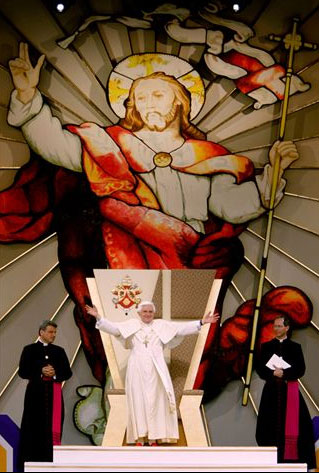 The power to destroy does, however, remain. To pretend otherwise would be to fool ourselves. Yet, it never triumphs; it is defeated. This is the essence of the hope that defines us as Christians; and the Church recalls this most dramatically during the Easter Triduum and celebrates it with great joy in the season of Easter! The One who shows us the way beyond death is the One who shows us how to overcome destruction and fear: thus it is Jesus who is the true teacher of life (cf. "Spe Salvi," 6). His death and resurrection mean that we can say to the Father “you have restored us to life!” (Prayer after Communion, Good Friday). And so, just a few weeks ago, during the beautiful Easter Vigil liturgy, it was not from despair or fear that we cried out to God for our world, but with hope-filled confidence: dispel the darkness of our heart! dispel the darkness of our minds! (cf. Prayer at the Lighting of the Easter Candle).
The power to destroy does, however, remain. To pretend otherwise would be to fool ourselves. Yet, it never triumphs; it is defeated. This is the essence of the hope that defines us as Christians; and the Church recalls this most dramatically during the Easter Triduum and celebrates it with great joy in the season of Easter! The One who shows us the way beyond death is the One who shows us how to overcome destruction and fear: thus it is Jesus who is the true teacher of life (cf. "Spe Salvi," 6). His death and resurrection mean that we can say to the Father “you have restored us to life!” (Prayer after Communion, Good Friday). And so, just a few weeks ago, during the beautiful Easter Vigil liturgy, it was not from despair or fear that we cried out to God for our world, but with hope-filled confidence: dispel the darkness of our heart! dispel the darkness of our minds! (cf. Prayer at the Lighting of the Easter Candle).
What might that darkness be? What happens when people, especially the most vulnerable, encounter a clenched fist of repression or manipulation rather than a hand of hope? A first group of examples pertains to the heart. Here, the dreams and longings that young people pursue can so easily be shattered or destroyed. I am thinking of those affected by drug and substance abuse, homelessness and poverty, racism, violence, and degradation -- especially of girls and women. While the causes of these problems are complex, all have in common a poisoned attitude of mind which results in people being treated as mere objects -- a callousness of heart takes hold which first ignores, then ridicules, the God-given dignity of every human being. Such tragedies also point to what might have been and what could be, were there other hands -- your hands -- reaching out. I encourage you to invite others, especially the vulnerable and the innocent, to join you along the way of goodness and hope.
The second area of darkness -- that which affects the mind -- often goes unnoticed, and for this reason is particularly sinister. The manipulation of truth distorts our perception of reality, and tarnishes our imagination and aspirations. I have already mentioned the many liberties which you are fortunate enough to enjoy. The fundamental importance of freedom must be rigorously safeguarded. It is no surprise then that numerous individuals and groups vociferously claim their freedom in the public forum. Yet freedom is a delicate value. It can be misunderstood or misused so as to lead not to the happiness which we all expect it to yield, but to a dark arena of manipulation in which our understanding of self and the world becomes confused, or even distorted by those who have an ulterior agenda.
Have you noticed how often the call for freedom is made without ever referring to the truth of the human person? Some today argue that respect for freedom of the individual makes it wrong to seek truth, including the truth about what is good. In some circles to speak of truth is seen as controversial or divisive, and consequently best kept in the private sphere. And in truth’s place -- or better said its absence -- an idea has spread which, in giving value to everything indiscriminately, claims to assure freedom and to liberate conscience. This we call relativism. But what purpose has a “freedom” which, in disregarding truth, pursues what is false or wrong? How many young people have been offered a hand which in the name of freedom or experience has led them to addiction, to moral or intellectual confusion, to hurt, to a loss of self-respect, even to despair and so tragically and sadly to the taking of their own life? Dear friends, truth is not an imposition. Nor is it simply a set of rules. It is a discovery of the One who never fails us; the One whom we can always trust. In seeking truth we come to live by belief because ultimately truth is a person: Jesus Christ. That is why authentic freedom is not an opting out. It is an opting in; nothing less than letting go of self and allowing oneself to be drawn into Christ’s very being for others (cf. "Spe Salvi," 28).
How then can we as believers help others to walk the path of freedom which brings fulfillment and lasting happiness? Let us again turn to the saints. How did their witness truly free others from the darkness of heart and mind? The answer is found in the kernel of their faith; the kernel of our faith. The Incarnation, the birth of Jesus, tells us that God does indeed find a place among us. Though the inn is full, he enters through the stable, and there are people who see his light. They recognize Herod’s dark closed world for what it is, and instead follow the bright guiding star of the night sky. And what shines forth? Here you might recall the prayer uttered on the most holy night of Easter: “Father we share in the light of your glory through your Son the light of the world … inflame us with your hope!” (Blessing of the Fire). And so, in solemn procession with our lighted candles we pass the light of Christ among us. It is “the light which dispels all evil, washes guilt away, restores lost innocence, brings mourners joy, casts out hatred, brings us peace, and humbles earthly pride” (Exsultet). This is Christ’s light at work. This is the way of the saints. It is a magnificent vision of hope -- Christ’s light beckons you to be guiding stars for others, walking Christ’s way of forgiveness, reconciliation, humility, joy and peace.
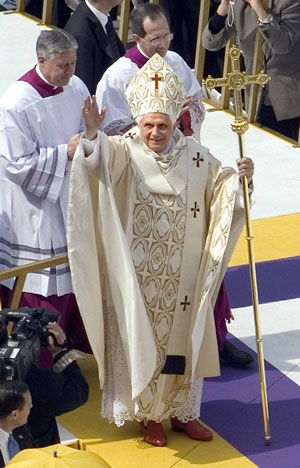 Dear Brothers and Sisters in Christ,
Dear Brothers and Sisters in Christ,
In the Gospel we have just heard, Jesus tells his Apostles to put their faith in him, for he is "the way, and the truth and the life" (Jn 14:6). Christ is the way that leads to the Father, the truth which gives meaning to human existence, and the source of that life which is eternal joy with all the saints in his heavenly Kingdom. Let us take the Lord at his word! Let us renew our faith in him and put all our hope in his promises!
The first reading also makes clear, as we see from the imposition of hands on the first deacons, that the Church’s unity is "apostolic". It is a visible unity, grounded in the Apostles whom Christ chose and appointed as witnesses to his resurrection, and it is born of what the Scriptures call "the obedience of faith" (Rom 1:5; cf. Acts 6:7).
"Authority" … "obedience". To be frank, these are not easy words to speak nowadays. Words like these represent a "stumbling stone" for many of our contemporaries, especially in a society which rightly places a high value on personal freedom. Yet, in the light of our faith in Jesus Christ -- "the way and the truth and the life" -- we come to see the fullest meaning, value, and indeed beauty, of those words. The Gospel teaches us that true freedom, the freedom of the children of God, is found only in the self-surrender which is part of the mystery of love. Only by losing ourselves, the Lord tells us, do we truly find ourselves (cf. Lk 17:33). True freedom blossoms when we turn away from the burden of sin, which clouds our perceptions and weakens our resolve, and find the source of our ultimate happiness in him who is infinite love, infinite freedom, infinite life. "In his will is our peace".
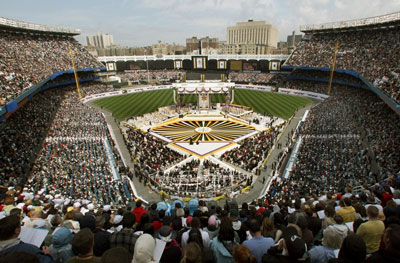 Real freedom, then, is God’s gracious gift, the fruit of conversion to his truth, the truth which makes us free (cf. Jn 8:32). And this freedom in truth brings in its wake a new and liberating way of seeing reality. When we put on "the mind of Christ" (cf. Phil 2:5), new horizons open before us! In the light of faith, within the communion of the Church, we also find the inspiration and strength to become a leaven of the Gospel in the world. We become the light of the world, the salt of the earth (cf. Mt 5:13-14), entrusted with the "apostolate" of making our own lives, and the world in which we live, conform ever more fully to God’s saving plan.
Real freedom, then, is God’s gracious gift, the fruit of conversion to his truth, the truth which makes us free (cf. Jn 8:32). And this freedom in truth brings in its wake a new and liberating way of seeing reality. When we put on "the mind of Christ" (cf. Phil 2:5), new horizons open before us! In the light of faith, within the communion of the Church, we also find the inspiration and strength to become a leaven of the Gospel in the world. We become the light of the world, the salt of the earth (cf. Mt 5:13-14), entrusted with the "apostolate" of making our own lives, and the world in which we live, conform ever more fully to God’s saving plan.
Each day, throughout this land, you and so many of your neighbors pray to the Father in the Lord’s own words: "Thy Kingdom come". This prayer needs to shape the mind and heart of every Christian in this nation. It needs to bear fruit in the way you lead your lives and in the way you build up your families and your communities. It needs to create new "settings of hope" (cf. Spe Salvi, 32ff.) where God’s Kingdom becomes present in all its saving power.
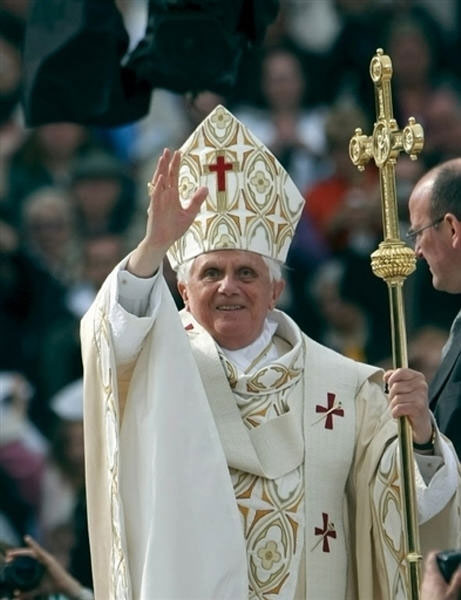 Praying fervently for the coming of the Kingdom also means being constantly alert for the signs of its presence, and working for its growth in every sector of society. It means facing the challenges of present and future with confidence in Christ’s victory and a commitment to extending his reign. It means not losing heart in the face of resistance, adversity and scandal. It means overcoming every separation between faith and life, and countering false gospels of freedom and happiness. It also means rejecting a false dichotomy between faith and political life, since, as the Second Vatican Council put it, "there is no human activity -- even in secular affairs -- which can be withdrawn from God’s dominion" (Lumen Gentium, 36). It means working to enrich American society and culture with the beauty and truth of the Gospel, and never losing sight of that great hope which gives meaning and value to all the other hopes which inspire our lives.
Praying fervently for the coming of the Kingdom also means being constantly alert for the signs of its presence, and working for its growth in every sector of society. It means facing the challenges of present and future with confidence in Christ’s victory and a commitment to extending his reign. It means not losing heart in the face of resistance, adversity and scandal. It means overcoming every separation between faith and life, and countering false gospels of freedom and happiness. It also means rejecting a false dichotomy between faith and political life, since, as the Second Vatican Council put it, "there is no human activity -- even in secular affairs -- which can be withdrawn from God’s dominion" (Lumen Gentium, 36). It means working to enrich American society and culture with the beauty and truth of the Gospel, and never losing sight of that great hope which gives meaning and value to all the other hopes which inspire our lives.
And this, dear friends, is the particular challenge which the Successor of Saint Peter sets before you today. As "a chosen people, a royal priesthood, a holy nation", follow faithfully in the footsteps of those who have gone before you! Hasten the coming of God’s Kingdom in this land! Past generations have left you an impressive legacy. In our day too, the Catholic community in this nation has been outstanding in its prophetic witness in the defense of life, in the education of the young, in care for the poor, the sick and the stranger in your midst. On these solid foundations, the future of the Church in America must even now begin to rise!
"Happy are you who believe!" (cf. 1 Pet 2:7). Let us turn to Jesus! He alone is the way that leads to eternal happiness, the truth who satisfies the deepest longings of every heart, and the life who brings ever new joy and hope, to us and to our world. Amen.